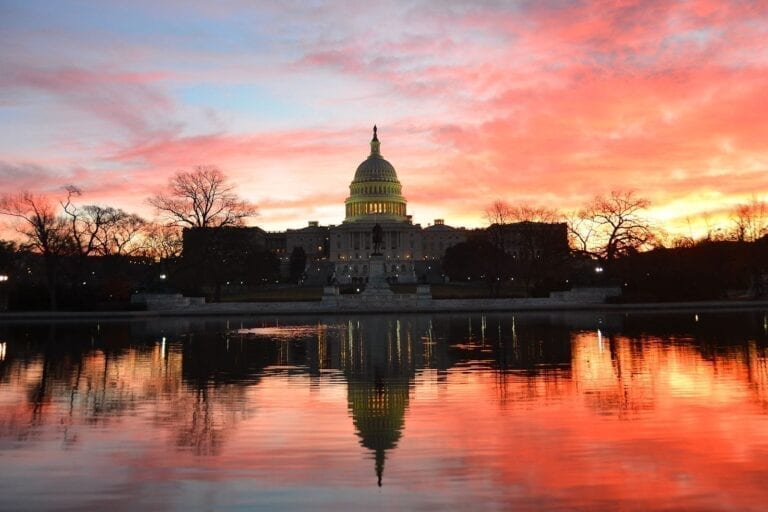The 2020 presidential election is still a few months away. And in the face of the coronavirus pandemic, primary elections continue. Joe Biden is leading the Democratic Party presidential primaries. President Donald Trump has also come out on top. With enough delegates (1,276), he is set to become the Republican presidential nominee for 2020.
Enough has happened this year, however, that the 2020 election predictions are hazy. Coronavirus cases have been confirmed in all 50 states. Washington, California, Florida, New Jersey, and New York have already reported hundreds of cases. As a result of the rising fear of the COVID-19 pandemic, the US stock market continues to suffer. Even after the Federal Reserve announced its move to a 0% interest rate, major stocks continued to drop.
The current state of uncertainty for the 2020 election and the general future of the US has naturally found its way into the US housing market. The US real estate market is already feeling the impact of the coronavirus. But what about the impact of the 2020 election on the US housing market?
How the US Housing Market Could Change Due to the 2020 Election
2020 is a unique year for tracking US real estate trends. This is simply because, at this point in time, so many different factors are making their mark on housing. And it’s not just the coronavirus, which so far has rocked the Airbnb market. Even the performance of the stock market can affect the real estate market. So how much more could the 2020 election do to the US housing market? As it turns out, historical housing market trends show us that a presidential election can cause some disturbance in the real estate market.
Why?
Before we take a look at what could happen to the US housing market around the time of the 2020 election, let’s answer the question of why. Why would the 2020 US election cause any changes in the real estate market?
Well, consumers drive the US housing market. And during an election year, US consumers go through times of uncertainty and fear. When the election predictions can’t point to a clear winner, people worry about who will be the next leader. How will the US economy fare? What changes in tax policy will come about? How will the stock market be affected? And with the current state of things in 2020, uncertainty is at a high and emotion becomes the driver in the market. So it’s a possibility that the following real estate trends could be exacerbated as we get closer to the 2020 election.
US Home Sales May Drop

It’s likely that the 2020 election will cause a drop in home sales between October and November.
Generally, the fall real estate market sees a drop in US home sales. Following the hot summer season, this is typical in Q3. However, research shows that in an election year, the drop is greater. Looking at housing market data for the last 13 election cycles, a study found that, during an election year, the median change in home sales is -15% from October to November. This is, of course, right around election time. The data for the year after an election shows the median change in home sales during the fall is only -8%.
So, if you’re thinking of selling your property in 2020, you may have a difficult time close to the presidential election. On the other hand, if you’re buying an investment property, you may find less competition in the market from October to November 2020.
US Home Price Appreciation May Slow Down
The US housing market has witnessed massive price gains in most major markets over the past few years. However, historical data from the California Association of Realtors predicts a possible decrease in price gains around the time of the 2020 election. Real estate market analysis of the year before, the year of, and the year after a US presidential election revealed the following:
- The year before a presidential election: +6% home price appreciation
- The year of a presidential election: +4.5% home price appreciation
- The year after a presidential election: +5.3% home price appreciation
The same study points out that, although the 1.5% drop in real estate appreciation may not seem like a big change, it can amount to a difference of a few thousand dollars. This, of course, depends on the US median property price of the time.
New Tax Laws and Policies May Come Into Play
Rich Schulhoff, CEO of Brooklyn MLS, told Mashvisor that, from his experience:
The presidential elections affect local housing markets if the candidate has an agenda. The largest impact on the market presidents have, is how they will deal with the federal funds rate, which can in turn impact mortgage rates. My belief is that real estate affects politics, simply because of interest rates, the lower the interest rate the more people can afford to get a mortgage or put a higher down payment which increases business. In the past elections, President Trump was known to be a real estate man who had a positive vision for the real estate market. Rates skyrocketed because he promised that the economy will be at its riches. One example of a promise he made was increasing U.S manufacturing which will increase the number of jobs available, lowering the unemployment rate.
Democratic presidential candidates Joe Biden and Bernie Sanders each have their own proposed plan to make changes to the individual income tax rate. Both propose increases in the current tax rates. If he were to win the 2020 election, Biden’s plan also proposes possible changes to President Donald Trump’s Tax Cuts and Jobs Act (TCJA). Speaking of which, President Donald Trump made waves in the US housing market with the TCJA as well as the introduction of Opportunity Zones.
Leading up to the 2020 election, many players may sit on the sidelines as they wait for any new changes in taxes that could have an impact (positive or negative) on their ability to buy and sell real estate. This is part of why the volume of home sales may drop around the time of a presidential election.
The Washington DC Housing Market Is Likely to Get a Boost
One US housing market trend that most experts agree will come about from the 2020 election as it has from past presidential elections is a boost for the DC housing market. Typically, in the year of and following a presidential election, the Washington DC real estate market gets a boost in sales. And home price gains also increase. So, if you own a Washington DC investment property and are thinking of selling, after the 2020 election may be the time to do it.
What if you’re looking to buy a rental property in the Washington DC housing market? Well, with the aforementioned real estate trends, it’s likely that the DC real estate market will see growth later this year and next year. Even if you’re not looking to sell a property quickly, the buy and hold real estate investment strategy would be profitable in this market combined with the rental property investment strategy. When it comes to short term rentals, you can benefit from using an Airbnb calculator to help determine potential profits.
Since Q1 2000, Washington DC real estate has appreciated by a total of 304%, according to NeighborhoodScout. So a DC real estate investor won’t just enjoy appreciation after the 2020 election but likely in the years to come. It’s also important to note that with the homeownership rate so low in DC (60.8% of DC residents are renters), owning a rental property can bring you a good rate of return on investment beyond just the appreciation due to the 2020 election. Just take a look at Mashvisor’s real estate market data for DC:
Washington DC Housing Market Data
- Median Property Price: $739,315
- Price per Square Foot: $519
- Price to Rent Ratio: 23
- Traditional Rental Income: $2,655
- Traditional Cap Rate: 1.7%
Top 3 Washington DC Neighborhoods for Rental Property Investing
#1. Navy Yard
- Median Property Price: $634,149
- Price per Square Foot: $643
- Price to Rent Ratio: 16
- Traditional Rental Income: $3,359
- Traditional Cap Rate: 3.1%
#2. Adams Morgan
- Median Property Price: $702,630
- Price per Square Foot: $672
- Price to Rent Ratio: 18
- Traditional Rental Income: $3,225
- Traditional Cap Rate: 2.4%
#3. Logan Circle
- Median Property Price: $809,997
- Price per Square Foot: $728
- Price to Rent Ratio: 21
- Traditional Rental Income: $3,200
- Traditional Cap Rate: 2.3%
Start your search for a Washington DC investment property for sale to benefit from the boom after the 2020 election.
The 2021 US Housing Market May Be Hot
The final trend that could come about in the US housing market after the 2020 election is high demand. In the past, when buyers sat on the sidelines leading up to a presidential election, they usually rushed back into the market once the dust had settled and the future of the US became somewhat clearer. So it’s very possible that the 2021 US housing market forecast will hold high demand from buyers, more inventory shortages, and higher price gains.
A Few Final Words
Keep in mind that this real estate market analysis is based on historical data and trends that connect the US housing market to a presidential election. As mentioned, 2020 is a unique year with a lot of different elements coming into play. It’s possible that all of the US housing market predictions will come to fruition or that they may be skewed by other current events. And there are a few more things to keep in mind about this analysis:
- As seen from some of the data above, most of the changes that come about from a presidential election are short-lived. They happen around the time of the election.
- Besides changes in real estate taxes or policies, most of these trends have taken place regardless of who is elected as US president.
- Mortgage rates are very low right now and the 2020 forecast shows that they will drop even more. This could, for instance, drive sales or change the course of the other aforementioned trends.
To truly see how the US housing market will be affected as citizens hit the polls, we will have to wait and see.
Stay up to date on real estate news around the US housing market by signing up for Mashvisor now.
